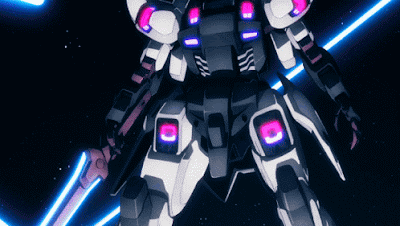Synopsis:
At the futuristic Asticassia School of Technology, elite students are trained as the next generation of mobile suit pilots, engineers, and business managers. The newest transfer to the high-tech academy is Suletta Mercury, a socially awkward but highly skilled young pilot who arrives in tandem with the Aerial, a powerful mobile suit containing deep secrets. Suletta quickly forms an unusual bond with Miorine Rembran - heir to the influential Benerit Group conglomerate that runs the school - and must navigate the social nuances of her new environment, surviving duels with rival students, corporate espionage, and deadly para-military conflicts.
Release Date:
2022-2023
Episodes:
25 (including pilot)
Timeline:
A.S. 122
My Grade:
B
Leah and I were thrilled to experience the first new Gundam series to release since we began our years-long adventure watching the entirety of the Gundam franchise back in 2020. We were immediately floored with the gorgeous visuals and soaring musical score of The Witch From Mercury. However, within a few episodes, something felt off. We found ourselves pondering questions such as, "Is this really what this series is about?", "When is the real story going to begin?", "Why are these characters so different from the pilot?", and "Is Suletta supposed to be this weird?" Now that the series is concluded, we have our answers, though many of them are not as satisfying as one might hope.
We were disheartened when it became clear that The Witch From Mercury follows a typical "student academy" anime theme, including melodramatic duels (commenced by shouting silly catchphrases) where the ultimate prize is engagement rights to the top girl. Suletta immediately stumbles into winning Miorine's spousal rights, mainly due to her mobile suit, the Aerial, being essentially magical. Leah pointed out that this plot device has been done many times over in other anime, notably Revolutionary Girl Utena. Though Suletta and Miorine gradually develop an intriguing relationship, the show can't quite decide if it has the guts for this to be a romance between two young women or more of a strong friendship. Sitting in the undecided middle, it ends up feeling like neither, and the characters instead exude an uncanny inhuman vibe like they were written by an alien. I get it - this is a yuri anime and this is normal for that genre, but ultimately I need to review the content from my own perspective and whether I think it works on its own merits.
We found aspects of the story somewhat confusing as well. There's a perplexing disconnect between the events of the pilot and the main series - some of this is intentional and eventually explained in one of the bigger plot twists, while the rest, e.g. Suletta's mom's change in appearance, is left to the imagination (I can guess that she changed her look because she was in hiding, but it would be nice if the series gave us a scene depicting that). There's also a lot of tech mumbo jumbo like "permet", "data storms", and other concepts that remain esoteric throughout the series, and which are ultimately better glossed over as "space magic".
Suletta is a complete spaz. The intent seems to be that she's a lovable klutz who is a fish out of water in the fancy new academic environment, but it's tough to root for somebody so odd and insecure. Virtually all her lines are stammered as if she's constantly on the verge of an anxiety attack. She's simultaneously a psychopath, for instance she exhibits terrifying casualness after brutally smashing an enemy soldier and subsequently becoming drenched in his liquified remains. This infamous scene toward the end of the first season teases the viewer with a hint of more serious ramifications to come, but then largely sweeps it all under the rug and returns to the status quo, pretending her actions weren't that big a deal. Suletta's unquestioning attachment to her mother is another source of creepiness - again, she does eventually grow out of this, but her starting point is so extreme that she comes off as a pod person rather than a sheltered youth. As such, it's hard to watch when characters in the show, especially Miorine, who is otherwise competent and perceptive, don't seem to think these traits are that big a deal, making everyone seem strange and unrealistic.
 |
| The splat heard round the world. |
 |
| It's important to lay a strong foundation of trust in any marriage. |
The extended cast is colorful and has some interesting personalities, like Guel, Shaddiq, and Elan. I spent most of the series wishing Guel was the main character, as I found his fall from status as an arrogant aristocrat and subsequent transformation into a selfless, loyal individual to be the most entertaining character arc of the series (even if it felt rushed at points). The nearly two dozen other side characters that essentially serve as entourages to the various main characters felt entirely bloated and unnecessary - even by the end, we were having a hard time remembering which of these various NPCs were aligned with which faction, or even what their names were.












Comments
Post a Comment